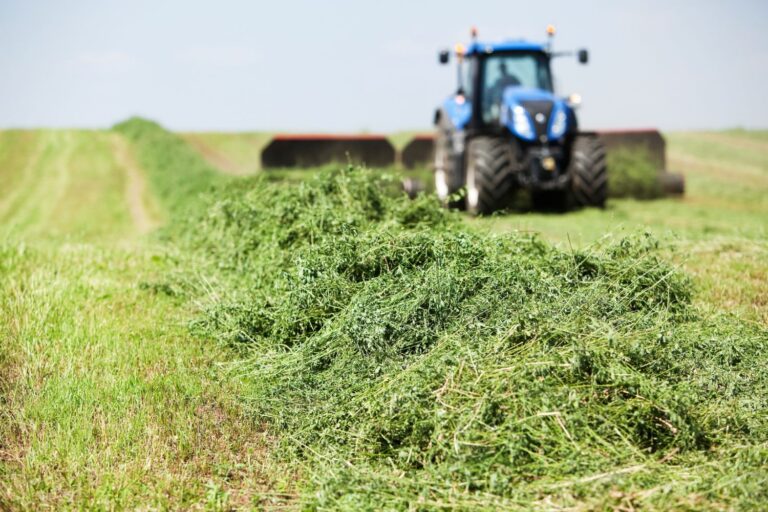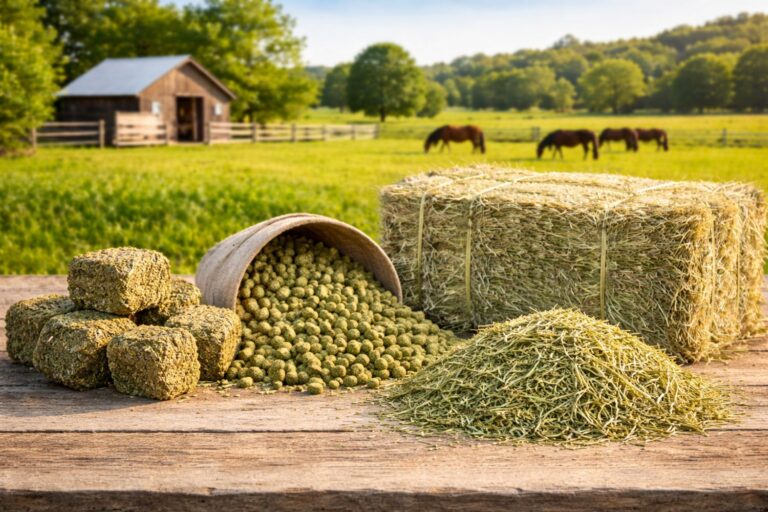Alfalfa is more than just a common feed; it’s a powerhouse of nutrition that can significantly boost the health and performance of horses. Known for its high protein, minerals, and vitamins, alfalfa plays a crucial role in equine diets, especially for those in active work or with specific nutritional needs. This blog explores the benefits of alfalfa in horse feed, how to incorporate it into your horse’s diet, and the common misconceptions about this nutrient-rich forage.
Why Alfalfa?
Alfalfa, also known as Lucerne, is highly valued in the horse feed industry for its superior nutritional profile. Here are the key benefits it offers:
- High Nutritional Value: Alfalfa is rich in protein, essential for muscle development and repair. It also boasts a higher mineral content, including calcium, phosphorus, and magnesium, than other forages, making it an excellent choice for young, growing horses, lactating mares, and performance horses.
- Energy Content: Alfalfa provides more calories than grass hays, which can be particularly beneficial for horses needing more energy in their diet, such as those used for endurance or heavy work.
- Digestive Health: The high fiber content in alfalfa promotes healthy digestion. It can help prevent ulcers by buffering stomach acids, making it a good forage choice for horses prone to digestive issues.
- Palatability: Alfalfa is highly palatable for most horses, encouraging them to eat well, which is particularly beneficial for picky eaters or older horses with appetite issues.
Incorporating Alfalfa into Your Horse’s Diet
While alfalfa offers numerous benefits, it’s important to integrate it into your horse’s diet correctly:
- Balance: Alfalfa should be part of a balanced diet. It can be fed along with grass hay to provide a balanced fiber ratio and prevent too much protein intake, which can be excessive if alfalfa is the sole forage source.
- Portion Control: Due to its higher calorie content, monitor the amount of alfalfa you feed, especially to horses that are overweight or have limited exercise.
- Form: Alfalfa comes in various forms—bales, pellets, and cubes. Pellets and cubes are particularly useful for older horses with dental issues, while bales are suitable for daily feeding.
Common Misconceptions
Despite its benefits, alfalfa is sometimes misunderstood. Here are a few common misconceptions:
- Too Much Protein: While alfalfa is high in protein, feeding it as part of a balanced diet does not cause kidney damage or other health issues in healthy horses. Always adjust the total diet to ensure it’s suitable for your horse’s specific needs.
- Only for Certain Horses: Although traditionally favored for young or active horses, when used appropriately, alfalfa can be beneficial for almost any horse, provided their overall diet and health are managed correctly.
Alfalfa is a versatile and nutritious component of horse feed that supports health and performance when used appropriately. By understanding its benefits and how to properly incorporate it into your horse’s diet, you can effectively utilize alfalfa to enhance your horse’s well-being and performance. Whether you manage a stable of performance horses or care for a retired companion, alfalfa can play a pivotal role in your feeding regime.



